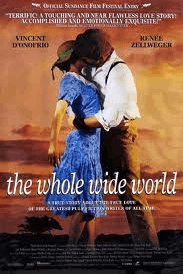The Whole Wide World

A biographical movie about Robert E. Howard, concentrating on his complicated relationship with Novalyne Price and based on her memoirs. Price, who dreams about becoming a writer herself, works as a Sunday school teacher, but when she meets Howard, her ambitions awake. She admires him and asks him for advice, even though she is appalled by the way in which he handles sexual themes in his stories. He does not share her opinion that good fiction should be true to life in the first place but she interests him as a woman and a friend. When Price fails in her desperate attempts to put an end to an abnormal relationship between Howard and his deceased mother, they break off, and she leaves to Louisiana to continue her teaching career - three weeks before Howard's suicide. Price's book was intended as a response to the prevailing opinions on Howard's life and personality, and the film explores her point of view to analyze Howard's creation and the reasons of his tragic death.
Besides being a psychological drama about love which somehow manages to be both mutual and unrequited, the film deals with such issues as: the process of achieving maturity, the nature of the connection between the mentor and his disciple, realist vs. visionary attitude towards fiction, the role of pulp (as opposed to mainstream) fiction in American culture in the 1930s, and artistic activity as a form of escapism triggered by the demands of society. The character of Conan the Barbarian is mentioned a couple of times - and it is suggested that Conan was Howard's simplified and coloured alter ego, which initially served as a channel for venting off his frustration but later became his gateway to insanity.
- Audible Sharpness: when Howard imagines himself to be Conan when he describes his character to Novalyne.
- Barbarian Hero: Conan, and, in a way, Howard himself.
- Downer Ending.
- Driven to Suicide: Howard, when he learns that his mother's illness is incurable.
- Drives Like Crazy: Howard.
- Everything Is Big in Texas: Howard's personality largely meets the stereotype. (Interestingly, the same features - loudness, cheerfulness and boastfulness - were attributed to Conan in Howard's fiction, which was explained as the result of his commitment to the culture of Asgard as opposed to cheerless Cimmeria.)
- Genteel Interbellum Setting
- Goodbye, Cruel World: after Howard's suicide a short poem about death is found in his typewriter.
- Hair-Trigger Temper: both Howard and Price.
- Henpecked Husband: Howard's dad.
- Hollywood Kiss.
- Hot Teacher: Novalyne.
- Incurable Cough of Death: Howard's mother.
- I Reject Your Reality.
- Mr. Imagination: Howard.
- My Beloved Smother: Howard and his mum.
- Loners Are Freaks: this is the point which Novalyne makes, when she tries to convince Robert that he should work over his social life.
- Magnificent Moustaches of Mexico: Howard seems to have a thing for Mexican sombreros, and at one point grows large moustache to complete the look.
- Man Child: Howard, in a way.
- Most Writers Are Male: Howard's fiction is presented as not targeted at female audience.
- Pulp Magazine: the pulpest of all, Weird Tales, appear a couple of times in the film.
- Relative Button: results from Howard's Mommy Issues (without the murder part).
- Reptiles Are Abhorrent: Howard describes to Price gigantic rattlers imagined by him.
- Sanity Slippage.
- Sexy Mentor: Howard to Price.
- Sidelong Glance Biopic
- Slice of Life: this is what Novalyne wants to write.
- Spirited Young Lady: Price.